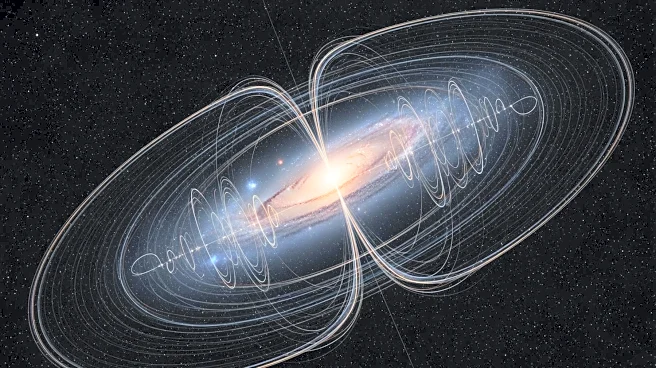What's Happening?
Researchers from the University of Geneva have confirmed that dark matter, a mysterious component of the universe, obeys gravity on large cosmological scales. This discovery challenges the notion of a fifth
fundamental force of nature, although it does not entirely rule out its existence. Dark matter, which does not interact with light or electromagnetic radiation, is inferred through its gravitational effects. The study involved comparing the velocities of galaxies with the depth of gravitational wells, which are created by massive bodies warping spacetime. The findings suggest that dark matter falls into these wells like ordinary matter, governed by gravity alone. However, if a fifth force exists, it cannot exceed 7% of gravity's strength, as it would have been detected in the analyses.
Why It's Important?
The confirmation that dark matter obeys gravity is significant for understanding the universe's structure and evolution. Dark matter accounts for five times more matter than ordinary matter, playing a crucial role in cosmic development. By limiting the strength of a potential fifth force, the study refines the characteristics of dark matter, aiding future research. This has implications for cosmology and physics, as it narrows down the forces that could govern dark matter. Upcoming experiments, such as the Legacy Survey of Space and Time and the Dark Energy Spectroscopic Instrument, are expected to provide more insights, potentially detecting forces as weak as 2% of gravity.
What's Next?
Future data from new experiments will further test the presence of a fifth force acting on dark matter. These experiments are expected to be sensitive to forces weaker than those currently detectable, offering a chance to learn more about dark matter's behavior. Researchers anticipate that these findings will contribute to a deeper understanding of the universe's fundamental forces and the role of dark matter in cosmic phenomena.
Beyond the Headlines
The study highlights the complexity of dark matter and the challenges in understanding its interactions. The potential existence of a fifth force raises questions about the fundamental nature of the universe and the forces that govern it. This research could lead to new theories in physics, reshaping our understanding of cosmic forces and the universe's composition.










